初中易混动词及词组汇编
初中易混动词及词组
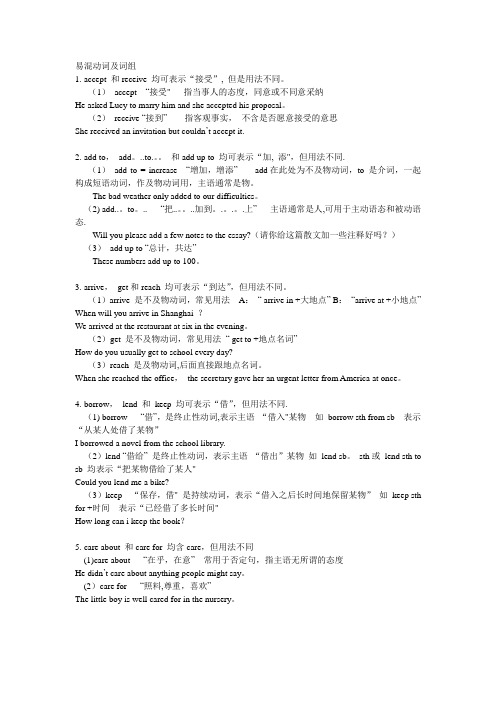
易混动词及词组1.accept 和receive 均可表示“接受”, 但是用法不同。
(1)accept “接受" 指当事人的态度,同意或不同意采纳He asked Lucy to marry him and she accepted his proposal。
(2)receive “接到”指客观事实,不含是否愿意接受的意思She received an invitation but couldn’t accept it.2.add to,add。
..to.。
和add up to 均可表示“加, 添",但用法不同.(1)add to = increase “增加,增添”add在此处为不及物动词,to 是介词,一起构成短语动词,作及物动词用,主语通常是物。
The bad weather only added to our difficulties。
(2) add..。
to。
.. “把..。
..加到。
.。
.。
.上”主语通常是人,可用于主动语态和被动语态.Will you please add a few notes to the essay?(请你给这篇散文加一些注释好吗?)(3)add up to “总计,共达”These numbers add up to 100。
3.arrive,get和reach 均可表示“到达”,但用法不同。
(1)arrive 是不及物动词,常见用法A:“ arrive in +大地点” B:“arrive at +小地点”When will you arrive in Shanghai ?We arrived at the restaurant at six in the evening。
(2)get 是不及物动词,常见用法“ get to +地点名词”How do you usually get to school every day?(3)reach 是及物动词,后面直接跟地点名词。
中考易混动词英语

中考易混动词(英语)1.几个“花费":spend, take, pay, cost(1) spend多用人作主语,后接金钱或时间。
spend.. on sth/ (in)doing sth(2) take常用于"It takes sb some time to do sth"句型中。
(3) pay常与for连用,表"付给... .款"。
(4) cost常用物作主语表“价值或花费多少钱”。
2.几个“看":look, see, watch, read, findlook看,表动作,look at。
see看见,表结果;也可说看电影"see a film"。
watch观看比赛、演出、电视等。
read读书看报等文字材料。
3.几个与“看”有关的词或词组:look for, find, find out, look after, take care of, look over, look forward to.look for寻找,表过程。
find发现,找到,表结果。
find out 找出,查明。
look after, take care of均表示“照看,照顾”。
look over检查、翻阅等。
look forward to盼望... ,期待....4.几个“说":say, speak, talk, tell(1)say用作及物动词或不及物动词。
用作及物动词时侧重说的内容;say用作不及物动词时,不涉及所说的内容。
(2)say之后通常跟直接引语、间接引语或宾语从句(2) speak常指能说某种语言,打电话时常用它表示说话,也有“演讲”的意思,不强调说话的内容(3)talk用作不及物动词,作“说话”讲时与speak可以互换使用。
作“交谈”讲时,通常与介词to / with连用。
(4)talk用作名词时,可以与动词have-起构成短语"have a talk with",意思是.和....谈一谈”。
动词短语及常见易混动词

三个提供 provide,supply,offer
1.provide提供,给予。含有“免费供给”的意味。 2.supply 供给,供应。通常指定期供应,强调替代或补 充所需物品。 3.offer提出,提供。强调“主动提供”,别人提供的可接 受也可拒绝 的物品,如帮助或服务。
四个花钱 cost,pay, spend,take
3.spend主语是人,常用sb.+spend(s)+ sth./(in)doing sth.结构。
时间/金钱on
I spend two hours playing football. He spends three hours on his homework. 4.take 主语是it(形式主语)It takes +sb.+时间/金钱 +to do sth.结构。 It takes me two days to do my homework.
三个听 listen,hear,sound
1.listen(注意地)听。不及物动词,常用 “listen to+名 词”结构,强调 听的过程。listen to music听音乐 2.hear听见,听到。及物动词,强调听的结果。 3.sound听起来。系动词,后接形容词,强调听的效果。 sound也可以加 介词like, 表示“听起来像”。 Sounds good/great!
四个花钱 cost,pay, spend,take
1.cost 主语是物,常用sth.+cost(s)+sb.+ 金钱结构。 The book costs me ten yuan. 2.pay 主语是人,常用sb.+pay(s)+ 金钱+for sth.结 构。 You should pay ten yuan for this book.
中考常考的易混动词短语总结
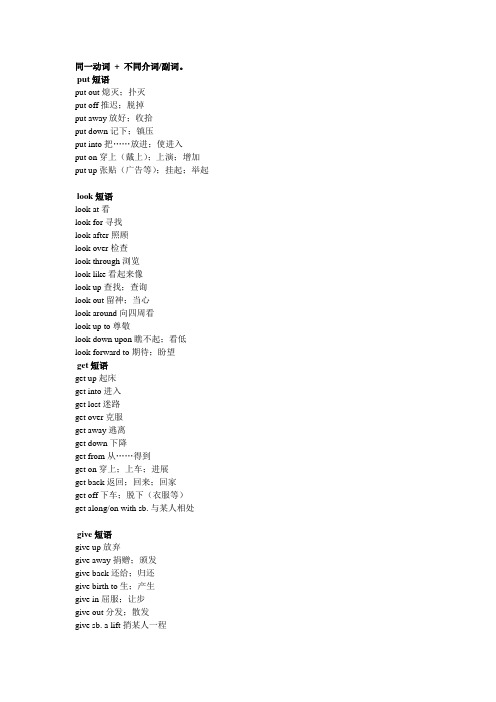
同一动词+ 不同介词/副词。
put短语put out 熄灭;扑灭put off 推迟;脱掉put away 放好;收拾put down 记下;镇压put into 把……放进;使进入put on 穿上(戴上);上演;增加put up 张贴(广告等);挂起;举起look短语look at 看look for 寻找look after 照顾look over 检查look through 浏览look like 看起来像look up 查找;查询look out 留神;当心look around 向四周看look up to 尊敬look down upon 瞧不起;看低look forward to 期待;盼望get短语get up 起床get into 进入get lost 迷路get over 克服get away 逃离get down 下降get from 从……得到get on 穿上;上车;进展get back 返回;回来;回家get off 下车;脱下(衣服等)get along/on with sb. 与某人相处give短语give up 放弃give away 捐赠;颁发give back 还给;归还give birth to 生;产生give in 屈服;让步give out 分发;散发give sb. a lift 捎某人一程take短语take away 拿走take out 取出take on 呈现;雇佣take over 接收;接管take down 记下;取下take after (外貌或行为)像take in 吸入;吞入(体内)take off 脱下(衣服等);起飞take up 从事(工作、兴趣爱好等);着手处理take part in 参加……;参与……take care of 照顾,照料(=look after)take pride in 感到自豪(=be proud of)turn短语turn on 打开turn off 关掉turn out 结果是turn up 调高(声音)turn over 翻身;翻转turn down 调低(声音)turn around 转身;调头go短语go on 继续go away 走开go back 回去go out 出去;熄灭go along... 沿着……走go over 仔细检查;复习go through 浏览;翻阅;通过come短语come from 来自come into 进入come in 进入;进来come out 出来;出版come up 发生;提到come down 下落;下降come on 来吧;赶快;加油come back 回来;想起来come over 顺便来访;过来come across (偶然)遇见(或发现)come along 一道去;进行;进展come true (希望等)实现;达到come up with 追上;赶上;想出(主意);提出fall短语fall behind 落后fall asleep 入睡fall ill 患病;病倒fall down 倒下;滑倒fall into 掉进……里fall off 从……掉下来fall in love with 爱上cut短语cut in 插嘴cut up 切碎cut down 削减;砍倒cut off 切断;中断call短语call off 取消call on 号召;拜访call up 给......打电话call for 要求;需要pick短语pick up 捡起;接载pick out 挑选;取出不同动词+ 同一介词/副词up短语eat up 吃光clean up 打扫drink up 喝光get up 起床give up 放弃make up 组成hurry up 赶快show up 出现think up 想出end up 结束take up 开始从事ring up 打电话fix up 修理;修补hang up 挂断电话bring up 教育;培养cheer up 使……开心grow up 成长;长大look up 查阅;向上看mix up 混合在一起put up 张贴;建造;举起set up 搭建;建立;设立out短语put out 扑灭sell out 卖光take out 取出work out 解决blow out 吹灭point out 指出get out 出去;离开go out 出去;熄灭hand out 分发;发放hang out 闲荡;闲逛run out 用尽;耗尽check out 查明;结账clear out 清理;丢掉set out 出发;启程keep out 不让……进入bring out 使显现;使表现出come out 出版;发表;结果是cut out 删除;删去;切断find out 查明;发现;了解try out 参加……选拔;试用clean out 清除;把……打扫干净break out (战争、火灾等)突然发生;爆发 away短语go away 走开take away 拿走get away 逃离throw away 扔掉run away 逃跑;跑掉give away 赠送;分发put away 把……收起来;整理on短语put on 穿上turn on 打开fight on 坚持pass on 传递keep on 继续(进行)try on 试穿;试试看work on 从事;忙于depend on 依赖;依靠come on 来吧;赶快;加油hold on 等一等(别挂电话)down短语cut down 砍倒fall down 倒下sit down 坐下break down 发生故障calm down 保持冷静put down 记下;放下let...down 使……失望或沮丧turn down 把……调小;关小write down 写下;记下;放下;镇压in短语arrive in 到达call in 拜访believe in 信任;信赖hand in 交上;提交;呈送join in 参加(=take part in)take in 吸入;吞入;欺骗take part in 参加……;参与……take pride in 对……感到自豪(=be proud of) off短语cut off 切除turn off 关掉go off 响;离开keep off 勿踏;勿踩take off 脱下;起飞put off 推迟;拖延clean...off 把……擦掉show off 炫耀;卖弄pay off 付清(欠款等)run off 跑掉;迅速离开break off 突然中止;中断set off 动身;起程;使爆发get off 脱下(衣服等);下车about短语think about 考虑care about 关心;在意talk about 谈论;讨论;议论worry about 担心;烦恼back短语get back 回来give back 归还;送回pay back 偿还(借款等)talk back 回嘴;顶嘴come back 回来;想起来bring back 恢复;使想起;归还call(sb.) back(给某人)回电话for短语wait for 等候;等待ask for 要;要求;请求thanks for 为……而感谢prepare for 为……做准备care for 关心;关怀;照顾pay for 付……账;付买……的钱from短语come from 来自hear from 收到……的来信learn...from... 向……学习……prevent from 妨碍;阻止;制止separate...from... 从……分开keep/stay...away from 避免接近;远离 into短语fall into 落入;陷入knock into 与……相撞turn...into 变成……divide into... 把……分成change into 转换成;把……变成get into 进入;陷入;习惯于look into 向……里面看;调查of短语hear of 听说think of 思考;考虑take care of 照顾;照看over短语fall over 绊倒look over 检查come over 顺便来访get over 克服;使(渡过)go over 仔细检查;复习to短语belong to 属于listen to... 听……stick to 坚持;固守talk to... 跟……说add...to... 把……加到……上lead to 导致;通向lend...to... 借……给……prefer...to... 喜爱……更甚于……help oneself to 随便吃点......hold on to 继续;坚持;保持pay attention to 对……注意;留心with短语deal with 处理;应付begin with 以……开始connect with 与……相连provide...with 给……提供……agree with 赞同;持相同意见compare...with... 把……与……作比较;把……与……作对比catch up with 赶上fall in love with 爱上get along/on with 与……相处make friends with 与……交友。
初中英语2024届中考复习常考易混单词和短语
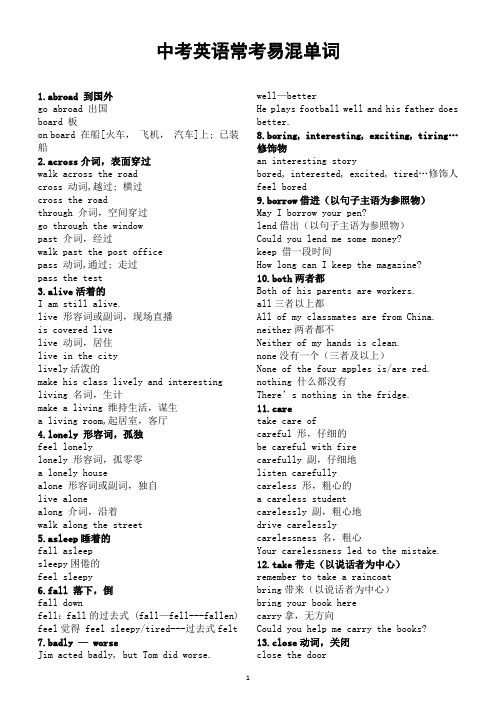
中考英语常考易混单词1.abroad 到国外go abroad 出国board 板on board 在船[火车,飞机,汽车]上; 已装船2.across介词,表面穿过walk across the roadcross 动词,越过; 横过cross the roadthrough 介词,空间穿过go through the windowpast 介词,经过walk past the post officepass 动词,通过; 走过pass the test3.alive活着的I am still alive.live 形容词或副词,现场直播is covered livelive 动词,居住live in the citylively活泼的make his class lively and interesting living 名词,生计make a living 维持生活,谋生a living room,起居室,客厅4.lonely 形容词,孤独feel lonelylonely 形容词,孤零零a lonely housealone 形容词或副词,独自live alonealong 介词,沿着walk along the street5.asleep睡着的fall asleepsleepy困倦的feel sleepy6.fall 落下,倒fall downfell:fall的过去式 (fall—fell---fallen) feel觉得 feel sleepy/tired---过去式felt 7.badly — worseJim acted badly, but Tom did worse. well—betterHe plays football well and his father does better.8.boring, interesting, exciting, tiring…修饰物an interesting storybored, interested, excited, tired…修饰人feel bored9.borrow借进(以句子主语为参照物)May I borrow your pen?lend借出(以句子主语为参照物)Could you lend me some money?keep 借一段时间How long can I keep the magazine?10.both两者都Both of his parents are workers.all三者以上都All of my classmates are from China. neither两者都不Neither of my hands is clean.none没有一个(三者及以上)None of the four apples is/are red. nothing 什么都没有There’s nothi ng in the fridge.11.caretake care ofcareful 形,仔细的be careful with firecarefully 副,仔细地listen carefullycareless 形,粗心的a careless studentcarelessly 副,粗心地drive carelesslycarelessness 名,粗心Your carelessness led to the mistake. 12.take带走(以说话者为中心)remember to take a raincoatbring带来(以说话者为中心)bring your book herecarry拿,无方向Could you help me carry the books?13.close动词,关闭close the doorclose 形容词,亲密的my closest friendclosed形,关着的keep the door closed14.closely副,密切地work closely with us15.brave形,勇敢的He is brave enough to save the old man. courage 名,勇气have the courage to tell him the bad news bravely 副,勇敢地face the difficulties bravely16.dead形容词,死的have been deaddie动,死亡die of hungerdeath名,死亡the death of his pet makes him so sad. 17.especially副,尤其He is good at all subjects, especially maths.specially副,专门The pen is specially designed for the boy. special形,特殊的a special day18.except除了All the students except Tom will go for a school trip.expect期待You are expected to bring it back when you return.19.excited形,激动的,修饰人feel excitedexciting形,激动人心的,修饰物an exciting filmexcitedly 副词,修饰动画shouted excitedlyexcitement名词shout with excitement20.a little一些,修饰不可数名词a little moneya few一些,修饰可数名词a few treeslittle几乎没有,修饰不可数名词There’s little water in the glass, is it? few几乎没有,修饰可数名词so few students21.form 形成form a good reading habitfrom 从……22.France法国/ French 法语German德国的/ Germany 德国23.hard努力work hardhardly几乎不The boy hardly does his homework.24.healthy健康的keep healthyhealth健康it’s good for your healthhealthily健康地eat healthily25.if如果主将从现If he comes, I’ll call you.是否I don’t know if he will come here. whether是否(如与or连用,则用)I wonder whether he’ll come or not. weather 天气What will the weather be like tomorrow?26.include 动词,包括The list includes the names of many famous writers.including 介词,包括They have many pets, including three cats.27.invent动词发明Edison invented a lot of things. invention名词发明The invention made much difference to humans.inventor名词发明者Edison was a great inventor.st 上一个的last year;最后的make her last apperance动词,持续The meeting will last one and a half hours. lasting 形,持久的a lasting value29.lie名词,谎言tell a lie动词,说谎He is always lying to us.动词,位于Japan lies to the east of China.动词,躺,平放He likes lying on the grass.躺,平放;位于:lie—lay---lain说谎:lie-lied-lied30.luck名,运气good lucklucky 形,幸运的a lucky numberluckily 副,幸运的是Luckily, we got better marks.unlucky/unluckily31.noise名,噪音Don’t make any noise.noisy 形,吵闹的much too noisynoisily 副,吵闹地talk noisily32.noise 名词,噪音sound 名词,声音We sat listening to the sound of the waves sound 动词,听起来The music sounds beautiful.voice 名词,嗓音The singer has a sweet voice.33.provide提供provide a chance for the boy=provide the boy with a chanceoffer 提供offer a chance to the boy=offer the boy a chance34.other别的,加名词other studentsanother另一个I don’t like the pair of shoes, would you like to show me another pair?the other 两个中的另一个,常用one…the otherHere is a shoe, where’s the other one? others= other+名词35.over/ under年龄的上下above/ below温度,楼层的上下36.peace名词,和平love peacepeaceful形,宁静的a peaceful villagepeacefully 副,和平地we hope to solve the problem peacefully.37.pleasure名,乐意。
中考易混动词短语总结大全

中考易混动词短语总结大全同一动词+不同介词/副词put短语put out熄灭;扑灭put off推迟;脱掉put away放好;收拾put down记下;镇压put into把……放进;使进入put on穿上(戴上);上演;增加put up张贴(广告等);挂起;举起look短语look at看look for寻找look after照顾look over检查XXX浏览look like看起来像look up查找;查询look out留神;当心look around向四周看look up to尊敬look down upon瞧不起;看低look forward to期待;盼望get短语get up起床get into进入get lost迷路get over克制get away逃离get down下降get from从……得到get on穿上;上车;进展get back返回;回来;回家get off下车;脱下(衣服等)get along/on with sb.与某人相处give短语give up放弃give away捐赠;颁发give back还给;清偿XXX;发生give in屈服;让步give out分发;散发XXX捎或人一程XXX短语XXX拿走XXX out取出take on呈现;雇佣XXX over接收;接管XXX down记下;取下take after(外貌或行动)像take in吸入;吞入(体内)take off脱下(衣服等);腾飞take up处置(事情、兴趣快乐喜爱等);动手处理take part in参加……;参与……take care of照顾,照管(=look after)take pride in感触高傲(=be proud of)turn短语turn on翻开turn off关掉turn out结果是turn up调高(声音)turn over翻身;翻转turn down调低(声音)turn around转身;调头go短语go on连续go XXX走开go XXX回去go out进来;熄灭go along。
容易混淆动词短语总汇
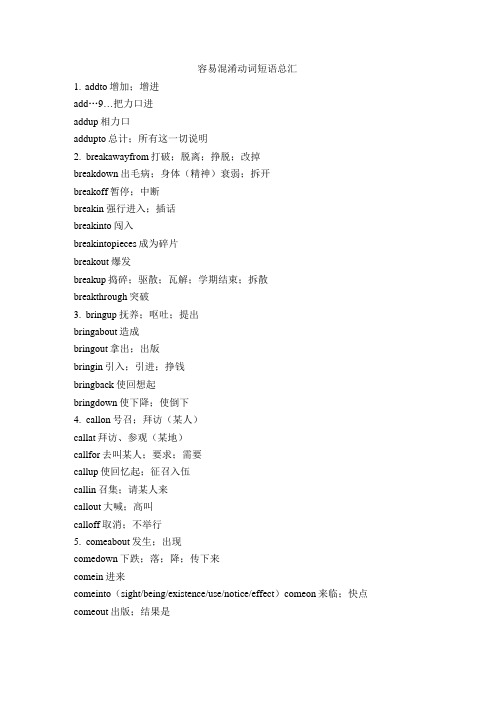
容易混淆动词短语总汇1.addto增加;增进add…9…把力口进addup相力口addupto总计;所有这一切说明2.breakawayfrom打破;脱离;挣脱;改掉breakdown出毛病;身体(精神)衰弱;拆开breakoff暂停;中断breakin强行进入;插话breakinto闯入breakintopieces成为碎片breakout爆发breakup捣碎;驱散;瓦解;学期结束;拆散breakthrough突破3.bringup抚养;呕吐;提出bringabout造成bringout拿出;出版bringin引入;引进;挣钱bringback使回想起bringdown使下降;使倒下4.callon号召;拜访(某人)callat拜访、参观(某地)callfor去叫某人;要求;需要callup使回忆起;征召入伍callin召集;请某人来callout大喊;高叫calloff取消;不举行eabout发生;出现comedown下跌;落;降;传下来comein进来comeinto(sight/being/existence/use/notice/effect)comeon来临;快点comeout出版;结果是comealong一道来;赶快cometo达至U(anend/anagreement/astop)苏醒;合计;总共是comeover走过来comeup发芽;走近comeacross偶然碰到comeback回想起comefrom来自;源自6.cutacross抄近路cutdown砍倒;削减cutoff切断;割掉;断绝关系cutup连根拔除;切碎through剪断;凿穿cutout删(省)掉;戒掉cutin插嘴7.dieof(disease/hunger/grief/oldage)死于(疾病、饥饿、寒冷、情感原因)diefrom死于(意外事故、情形)dieaway渐渐消逝dieout绝种diedown(炉火)渐熄dieoff逐一死去8.fallbehind落后falloverone’sfeet跌跤falldown掉下;跌倒fallback撤退;后退9.goinfor从事;喜爱;参加gothrough通过;经受goover复习;检查goup(价格)上涨;建造起来goafter追捕;追赶goagainst违反goahead先行;开始吧;问吧;说吧goaway离开goby时间过去godown下沉;降低;(日、月)西沉goon(with)继续进行gowith相配;陪同gowithout没有;缺少goout外出;熄灭goallout全力以赴gooff爆炸;进行;变坏;断电;停止供应gobackon背约;食言gobeyond超出10.getdown下来;记下;使沮丧getdownto致力于;专心于geton进展;进步;穿上;上车getoff脱下;下车getin收集;插(话)getaway逃跑;逃脱;去休假getover忘记;越过;克服;从疾病中恢复getalongwith进展;相处getup起床getthrough打通电话;完成;通过getround消息传开getclosetosth.接近;几乎getinto(trouble)陷入(麻烦)getto(know)逐渐(知道)getback取回;收回11.giveaway赠送;泄露;出卖giveout发出;疲劳;分发;公布giveoff发出(光、热、气体)givein(tosb.)屈服giveup放弃;让(座位)12.handin交上;提交handout分发handdown流传;遗传13.hangabout闲逛hangup挂电话14.holdback阻止;隐瞒holdup举起;使停顿holdon别挂电话;等等;坚持holdout持续;坚持;伸出holddown控制;镇压15.keepup(courage,spirits)保持(勇气、精神)keepupwith跟上keepoff(grass)不接近;离开keepawayfrom避开;不接近;离远远的keepoutof不让……进入……keepto(rules,promise)坚持、遵守(规则、诺言)keepon继续;坚持下来keepback阻止;留下;隐瞒;扣下keepfrom克制;阻止16.knockat/on敲knockinto撞到某人身上knockdown撞倒knockoutof把敲出knockover撞倒knockoff停止工作;休息17.leavefor离开前往leaveout删去;遗漏leavebehind遗留;忘记拿走leaveto留给;遗嘱赠于leaveover遗留;剩下;延期18.lookup查找;向上看lookthrough翻阅;浏览lookon旁观lookon…as看作……lookinto调查lookafter/at/for照顾/看/寻找look。
初中英语总复习易混词盘点(最新)
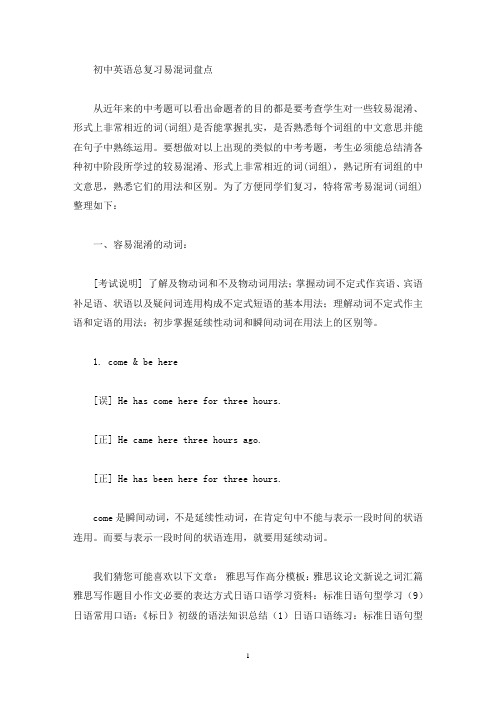
初中英语总复习易混词盘点从近年来的中考题可以看出命题者的目的都是要考查学生对一些较易混淆、形式上非常相近的词(词组)是否能掌握扎实,是否熟悉每个词组的中文意思并能在句子中熟练运用。
要想做对以上出现的类似的中考考题,考生必须能总结清各种初中阶段所学过的较易混淆、形式上非常相近的词(词组),熟记所有词组的中文意思,熟悉它们的用法和区别。
为了方便同学们复习,特将常考易混词(词组)整理如下:一、容易混淆的动词:[考试说明] 了解及物动词和不及物动词用法;掌握动词不定式作宾语、宾语补足语、状语以及疑问词连用构成不定式短语的基本用法;理解动词不定式作主语和定语的用法;初步掌握延续性动词和瞬间动词在用法上的区别等。
1. come & be here[误] He has come here for three hours.[正] He came here three hours ago.[正] He has been here for three hours.come是瞬间动词,不是延续性动词,在肯定句中不能与表示一段时间的状语连用。
而要与表示一段时间的状语连用,就要用延续动词。
我们猜您可能喜欢以下文章:雅思写作高分模板:雅思议论文新说之词汇篇雅思写作题目小作文必要的表达方式日语口语学习资料:标准日语句型学习(9)日语常用口语:《标日》初级的语法知识总结(1)日语口语练习:标准日语句型学习(7)日语口语:服装缝纫专用术语盘点日语口语常用教程:与看电视有关的词汇日语口语教材:标准日语句型学习(6)12年gre词汇表:词根cludgre词汇精选:词根juven 中考英语动态:初中英语总复习易混词盘点与此同类的还有borrow/lend-keep; join-be in/at; die-be dead; buy-have; leave-be away,etc.2. cost & take & spend & pay[误] I cost a lot of time to read stories.[正] It cost me a lot of time to read stories.[正] I spent a lot of time reading stories.cost除了钱的花费以外,还能表示时间上的花费,但常用物做主语。
- 1、下载文档前请自行甄别文档内容的完整性,平台不提供额外的编辑、内容补充、找答案等附加服务。
- 2、"仅部分预览"的文档,不可在线预览部分如存在完整性等问题,可反馈申请退款(可完整预览的文档不适用该条件!)。
- 3、如文档侵犯您的权益,请联系客服反馈,我们会尽快为您处理(人工客服工作时间:9:00-18:30)。
易混动词及词组1.accept 和receive 均可表示“接受”,但是用法不同。
(1)accept “接受”指当事人的态度,同意或不同意采纳He asked Lucy to marry him and she accepted his proposal.(2)receive “接到”指客观事实,不含是否愿意接受的意思She received an invitation but couldn’t accept it.2.add to, add...to... 和add up to 均可表示“加,添”,但用法不同。
(1)add to = increase “增加,增添”add在此处为不及物动词,to 是介词,一起构成短语动词,作及物动词用,主语通常是物。
The bad weather only added to our difficulties.(2)add...to... “把......加到......上”主语通常是人,可用于主动语态和被动语态。
Will you please add a few notes to the essay?(请你给这篇散文加一些注释好吗?)(3)add up to “总计,共达”These numbers add up to 100.3.arrive, get和reach 均可表示“到达”,但用法不同。
(1)arrive 是不及物动词,常见用法A: “ arrive in +大地点” B: “arrive at +小地点”When will you arrive in Shanghai ?We arrived at the restaurant at six in the evening.(2)get 是不及物动词,常见用法“ get to +地点名词”How do you usually get to school every day?(3)reach 是及物动词,后面直接跟地点名词。
When she reached the office, the secretary gave her an urgent letter from America at once.4.borrow, lend 和keep 均可表示“借”,但用法不同。
(1)borrow “借”,是终止性动词,表示主语“借入”某物如borrow sth from sb 表示“从某人处借了某物”I borrowed a novel from the school library.(2)lend “借给”是终止性动词,表示主语“借出”某物如lend sb. sth或lend sth to sb 均表示“把某物借给了某人”Could you lend me a bike?(3)keep “保存,借”是持续动词,表示“借入之后长时间地保留某物”如keep sth for +时间表示“已经借了多长时间”How long can i keep the book?5.care about 和care for 均含care,但用法不同(1)care about “在乎,在意”常用于否定句,指主语无所谓的态度He didn’t care about anything people might say.(2)care for “照料,尊重,喜欢”The little boy is well cared for in the nursery.6.look, see, watch 和read 均可表示“看”,但用法不同(1)look “看”表示动作,是不及物动词,后面需要加介词at 才能跟宾语。
Look!There is a plan in the sky.Look at the picture carefully.(2)see “看见”强调看到的结果,后面可直接跟宾语I can see the girl who is hiding behind the table.(3)watch “观看”尤指观看比赛,电视等It’s not good for children to watch TV for a long time.(4)read “读,看(书,报),表示阅读,后面可直接跟宾语。
Don’t read books in the sun. It will hurt your eyes.7.listen to 与hear 均可表示“听”,但用法不同(1)listen 是不及物动词,与to 构成固定搭配,listen to “听.......”, 强调听的动作Listen!What’s that noise?He likes listening to music.(2)hear “听到”,强调听到的结果She heard footsteps behind her.8.say, speak, talk和tell 均可表示“说”,但用法不同(1)say “说”,作为及物动词使用,其后常跟直接引语和间接引语He said he would come tonight.“Good night,” she said.(2)speak “讲话”,一般作为不及物动词使用,有时作为及物动词speak+各种语言May i speak to John, please?Do you speak English?(3)talk “谈话”,是不及物动词,talk about 表示“谈论关于......”talk to/with 表示“和......讲话”Mr. Thompson is talking with my father in the office now, please wait here for a moment.What are you talking about?(4)tell “告诉,讲述”,是及物动词,可带双宾语和复合宾语,常用结构,tell sb sth/that 从句;tell sb to do sth.The teacher told us an interesting story yesterday.She told us that we would have an English exam the next week.9.bring,take,fetch和carry 均可表示“拿,取”,但用法不同。
(1)bring “带来,拿来”只把某物和某人从另一个地方带到说话的地方来,或者可以说是由远及近Bring me you dictionary tomorrow.(2)take “带走”指把某物或某人从说话的地方带到另一个地方去,也可以说是“由近及远”,常和介词to 搭配Can you help me take the book to the classroom?(3)carry “提,扛,搬,携带”意思较多,没有方向性He is carrying water.(4)fetch “去拿,去取”,表示往返取物She went to fetch the kids.10.look for, search for和find均可表示“寻找”,但用法不同。
(1)look for “寻找”强调寻找的过程。
I am looking for the key. Do you see it?(2)search for “寻找,搜寻”其对象多是一个或一批人或物,如找矿,找资料,找文件,找工作等。
它强调寻找的行为,不着重结果。
They are searching for the missing child.(3)find “找到”强调寻找的结果。
Can you find my shoes?11.cost, pay,spend,和take 均可表示“花费”,但用法不同(1)cost “花费(时间或金钱)”,后面直接跟时间和金钱,但主语是物The book cost me 120 yuan.(2)pay “支付”词组“pay+金钱+for sth ”表示“为某物花了多少钱”,主语是人I paid 25 dollars for the dress.(3)spend “花费(时间和金钱)”常用结构“spend+时间或金钱+on sth或spend +时间或金钱+(in)doing sth”主语是人Mary spent 1,000dollars on the trip to the beach.She spent an hour dressing up her little sister.(4)take “花费(时间或金钱) 固定结构:It takes(各种时态)+sb+时间或金钱+to do sth It took me half a day to get there.12.dress, put on,wear和in 均可表示“穿”,但用法不同(1)dress常见用法有:dress sb 和dress sb up。
dress sb “给某人穿衣服”dress sb up “打扮某人”The boy dress himself quickly.My mother is dressing up my brother and they are going to a party.(2)put on “穿上,戴上”,表示动作After putting on his coat,Jim went out to play with his classmates.(3)wear “穿着,戴着”表示状态Bob is wearing a red shirt today.(4)in 表示穿着后面加衣服的颜色The man in a black shirt is my father.13.fail和lose 均可表示“失败”,但用法不同。
(1)fail “失败”可作不及物动词,常见用法:fail to do sth,表示“做某事失败,没能做成某事”Jimmy failed to pass the exam.(2)lose “输”后面可直接借比赛,战斗等,表示输掉比赛或战斗,也可用于lose to sb,表示输给某人I’am so sorry that you lose the game.14.beat和win 均可表示“打败”,但用法不同(1)beat “打败”常见用法: beat+某人或某支队伍,表示“打败某人或某队”Look! They are fighting. I think Tom will Li Lei but before that happens, stop them.(3)win “赢得”,如是赢得荣誉,比赛,地位等,表示某人经过努力和全力拼搏胜过其他人,不一定有正面对抗。
